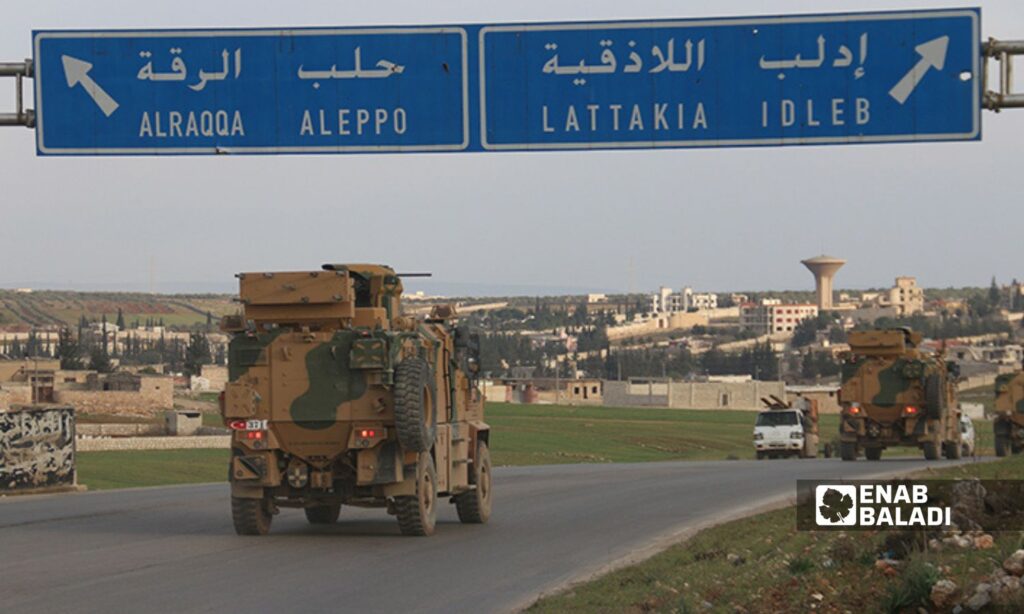An investigative report by the Syria Indicator team revealed violations by the Turkish army against private properties in northern Syria, due to the establishment of Turkish military bases and observation points on agricultural land.
The report, published on Tuesday, March 13, states that the owners of these agricultural lands signed what were supposed to be lease contracts, but received nothing in return, while others had their lands forcibly taken by the Turkish forces without financial compensation, causing severe economic losses to the landowners and the region’s economy at large.
The investigation presented two testimonies from farmers. The first did not receive any monetary compensation in exchange for leasing his agricultural land to the Turkish army for years, despite having signed a contract that should have entitled him to an annual payment of 700 US dollars per dunum, leading to a total amount ranging between 23 and 24 thousand dollars annually.
The Turkish forces occupied the farmer’s land in the town of Morek in the northern countryside of Hama for two and a half years (from April 2018 to October 2020), including seven weeks before the contract was signed, then about two years and four months after the signing. The land was also subjected to tree cutting and soil excavation.
According to the first farmer’s testimony, the Sham Legion faction was the intermediary between him and the Turks, but no one from the faction was able to secure his rights or reach any resolution. Ahmed Dolou, head of the legal office for the Sham Legion, denied the faction’s involvement in leasing the agricultural lands for use by the Turkish observation points, according to his statement to the investigative team.
The second testimony featured in the investigation belonged to one of the affected landowners in the village of Kaljabrin near Azaz in the northern countryside of Aleppo, who stated that he did not lease his land but rather it was taken by the Turkish army by force. He mentioned that his land spans 40 dunums.
He added that the Turkish forces took about five dunums and cut down about 900 pistachio trees, approximately 400 cherry trees, and grapevines to build earthen barriers, with promises of compensation that were never fulfilled. He estimates his annual losses at 15,000 US dollars.
What does the law say?
The investigative team reported that they contacted the Turkish Ministry of Defense to inquire about its commitment to protecting the rights of the agricultural landowners and compensating them for the economic damages incurred due to the transformation of their lands into observation points and military bases. The team also inquired about how the military operation is organized and managed on those lands, and the methodologies used. However, they received no response at the time of publication.
Lawyer Fouad Yazji, who was consulted by the landowner in Morek, stated that according to Syrian civil law, lease contracts “are concluded as soon as the consent and will of both parties are available, regardless of the means chosen by the contracting parties to express their intentions, as writing in this case, and as soon as they are concluded, obligations arise on the shoulders of the contractors.”
In this case, there should have been a representative for the farmer, which is the Syrian state, since it involved dealing with a foreign government wanting to establish a foreign military base on his agricultural land. However, what happened in reality was “individual, non-official actions within the context of coercive conditions, under the supervision of armed factions,” according to Yazji.
In the investigation, Syrian rights activist Mohammad al-Abdallah explained that defining and legally classifying behavior as a violation is one thing, and accountability for these violations is another. If all local remedies have been exhausted, or it was proven to be impossible to act upon them, the rights activist recommends resorting to the European Court of Human Rights, “because Turkey is a party to the European Convention on Human Rights, although the chances of success are very slim.”
According to the legal team of the Syrians for Truth and Justice (STJ) organization, the Syrian legislator did not address the situation of occupation of property or expropriation of ownership by a foreign state, and the Syrian law has not dealt with such issues. However, “such contracts are considered void because they were signed in a border area, and therefore it was necessary to obtain the required licensing according to the provisions of Decree 49 for the year 2008, amended by Decree 43 for the year 2011, and since the property owner did not obtain the required license as the property is outside the control of the Syrian government, the contract is void from the start.”
Heavy machinery within a Turkish convoy enters the countryside of Hama to establish the ninth observation point – April 7, 2018 (Enab Baladi)
125 military sites
Turkey operates 125 military sites in the region, including 57 in the countryside of Aleppo, 51 in the areas of Idlib, ten sites in Raqqa, four in al-Hasakah, two in the countryside of Latakia, and another in the countryside of Hama, according to the Jusoor for Studies center.
Turkey, in cooperation with the Syrian National Army (SNA), carried out three military operations inside Syria: “Euphrates Shield” which included areas around Azaz, Jarablus, al-Bab, Mare’, and al-Rai; “Olive Branch” which covered Afrin and its surroundings; and “Peace Spring” which comprised the cities of Tal Abyad and Ras al-Ain.

